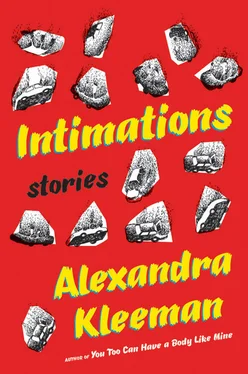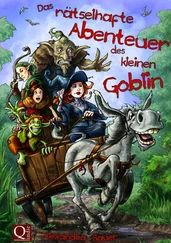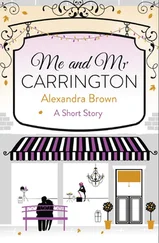Alexandra Kleeman
Intimations: Stories
Front Quote
“Perhaps the most distinctive stories in Alexandra Kleeman’s Intimations
are the brilliantly crafted nightmares about the dissolving of reality, but there is also everything here from an elegant Victorian tale of a feral child to a witty disquisition on the mouths of angels. A memory of childhood with an invented sister is told by way of a ‘brief history of weather,’ a romantic breakup by way of apocalyptic metaphors. This is ambitious, imaginative writing of the highest quality.”
— Robert Coover, author of The Public Burning
I was sitting at a long table with a lot of nice things on it. There was a large pitcher of water with an ornate handle that looked like it was made of real silver, and there were forks and spoons. There were apples and small, round appetizers, and a big dead cooked goose. There were so many things that the table underneath was eclipsed entirely; the visible objects obscured even more food, more tableware beneath.
My mother and father were sitting next to each other on the long side of the table, and a man I didn’t recognize at all was sitting next to them. I sat across on the other end, alone.
I was looking at all of the things and trying to notice connections between them. Why this table, why now? Why these things and not others? Many of the things were round. Except the goose. I tried looking from object to object: fork, butter, spinach, hand, napkin, apple, cup.
It was then that I noticed that none of the others seated at the table were looking at the table or its contents. They were all looking at me. They were looking continuously, there was no sense that they would soon be looking away. They had these looks on their faces. Especially the man. He had a look like he just would never ever get enough of looking. His eyes were like two little identical stones, the bare minimum of a face, just enough to make you look twice to check if you were looking at a person. You were announcing your engagement, said my father helpfully.
To who? I asked.
I felt a strange sense of ownership for all the objects on the table, yet I did not want to claim them.
To us, they said. All of you? I said.
No, only me, said the man in the button-up shirt, who I did not recognize.
I find it increasingly difficult to speak of my feelings at will.
I am announcing my engagement to you? I asked, gesturing at him. Yes, exactly, he said, looking satisfied. It seemed impossible to phrase the question in a way that would yield a perfectly unambiguous answer.
Who am I engaged to? I asked.
To me, he said, no longer looking satisfied.
The whole situation felt as unreal as something could while also feeling sorely, mortally dangerous. It seemed to draw strength from my speech, as in: the more I spoke within it, accepting its premises, the more I spoke into it without screaming at it, the more it made me whoever this position demanded.
Has anyone carved the goose? I asked. We’d better carve it before it gets cold, or hard. Before it reverses. We’d better do something before it changes.
Stay on topic, darling, and try to be polite, my mother replied. We were having a discussion, and it’s only a family discussion if you participate.
There was no way out. All the doors were far away and in the line of sight. I don’t think it’s unrelated, I said, or I don’t think it’s impolite. I am going to make one or both of those arguments, I said.
My suitor looked at his watch.
I think you’re being difficult, my mother replied. I think you should sit down and finish the announcement you started. There’s ice cream for after the announcement, and it’s already in the dishes melting.
The doorbell rang and I went to the door.
Standing outside was a man who looked almost entirely unfamiliar, like someone I had met maybe once through an acquaintance or circumstantial friend. Hi, he said. Oh hi, I replied. Who are you? I wanted to say. But instead I just looked at him, at his medium-size mouth, his large-size nose, his normal-size face.
I’m your boyfriend? he said helpfully, holding up a fistful of flowers.
I would have asked a follow-up question but instead I felt myself begin to slow down as if I had been filled up with damp sand. I thought about the person in the other room who said he was my fiancé, and I wondered if I had been designed to function within this situation or, instead, to somehow undo it.
I remember a proverb that I once found carved into the body of an old tree: whether the knife falls on the melon or the melon on the knife, the melon suffers.
Oh, hi, I said. Sweetheart?
I guided him into the kitchen and pointed him to the table. Mother, father, fiancé, I said, this is my boyfriend. My fiancé immediately began to look uncomfortable, but did not voice this discomfort except by a soft gurgling sound in the throat. I seated the boyfriend across from the fiancé and watched. Perhaps they would cancel each other out. How do you do, said the boyfriend to each member of the table in turn. He shook my father’s hand, kissed my mother’s, and nodded sharply at my fiancé. The gurgling escalated, but my mother politely switched on the dishwasher, and soon we heard mostly the sound of machinery rather than that of a person’s feelings surfacing.
He has some manners, said my father to no one in particular.
Perhaps we should carve the goose? said my boyfriend, rifling through the pile of silverware on the table. Where’s the knife? he asked. I remember an infomercial for a set of knives, their blades fortified with diamond powder. They were advertised as the only knives you’ll love to need, need to love, need to need, etc.! In the advertisement, anonymous hands wielded shiny shiny blades that chopped through butter and animal bone as if they were the same thing, through ice and tendon and untreated wood as if there was no difference between anything in the world — only a slight variation in grain, visible once something has been split in half.
All eyes turned toward me, and it was at this moment that I realized I was in my own house, and these things were my things.
I just don’t know, I said to everything.
At that moment, men were beginning to file into the room from somewhere else; they took positions in the corners of the room or in strategic corridors. Strange furnishings, they filled the space without filling the silence. They shuffled and stared, their silence had an eagerness.
Won’t you introduce us? they said.
I began to form a sentence beginning These are, but I lacked the words to complete it.
Who are you? I asked.
We’re your boyfriends, partners, paramours, they responded in a broken chorus.
I thought I would go first to check on the door, I must have forgotten to shut it. More might come if I didn’t close it quickly. There was a tension between the demands of the suitors and the capacities of the home, the structure of furnishings, plates, food that I had woken into. At the same time, there was a strange reciprocity between them, as the presence of a suitor seemed to demand the performance of hospitality, even as the presence of surplus plates, chairs, napkins, seemed to draw more strangers into the house.
I arrived to find the entryway empty, save for a man in what appeared to be a uniform stepping across the threshold.
I’m just the postman, he said. Oh, I said, please come in.
… Since you broke up with me, he finished.
Oh, I said. There was a stiff feeling in the air. If only I could remember one thing about him, I could say it out loud. Nice shirt, I said.
Читать дальше












